RV & Boat Mobile Satellite Internet
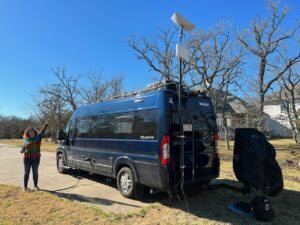
Satellite internet has come a long way - offering high-speed internet access in many places you can travel by RV or boat—when you have a clear view of the sky.
There is something magical and futuristic about being online and connected in the absolute middle of nowhere while parked in your RV or anchored on your boat. The places far beyond Wi-Fi or cellular coverage, where only a satellite far above can provide internet.
For many years, traditional old-school geostationary satellite internet options were available but came with many tradeoffs for RV and boat use—they were slow, expensive, and had much higher latency than cellular alternatives.
But an entirely new generation of satellite internet service has changed the game for RVs and boats - with companies like SpaceX offering low Earth orbit (LEO) satellite constellations that can deliver high-speed, lower-latency connectivity across much of the globe.
These options are rapidly evolving and are useful for providing internet for nomads working, living, or traveling in vans, boats or RVs.
This is an exciting industry to watch, and what we see already today was just a pipe dream a short few years ago, yet there is so much more to come!
Read on to find out more about what is available today and what is potentially coming tomorrow.
RV Mobile Satellite Options Update Article (2025)
Late 2025 Satellite Mobile Internet Update
If you're a member, please log in above to see your exclusive content.
Don't need a membership? Other ways you can support our work here:
-
As seen in our videos!
-
Get a FREE Month of Starlink!
And our team will get one too!
-
Get a FREE Month of T-Mobile Unlimited Data
Join the Calyx Institute, and get a bonus month - and we do too!
-
Save $20 on Visible
Verizon's prepaid phone plan, we also get a $20 credit.
-
Leave a Tip!
Send our team some beer money!!
-
Share About Us!
Link to our content, tell others about MIRC. It's Free!
It is with huge gratitude to our members for making the free unbiased educational content on our site possible. We're not sponsored, you'll find no 3rd party ads and we don't sell gear or data plans.
Our members get exclusive access to our in-depth content, classrooms, vendor discounts (that can save you more than membership!), alerts, insider info and interactive guidance. They can even book private advising sessions.
If mobile internet is an important part of your lifestyle, consider helping make MIRC possible by joining or supporting our mission.
The Low Earth Orbit (LEO) Satellite Revolution
Traditional RV and boat satellite internet options have relied on geostationary communication satellites that orbit over the equator. Since the satellites are moving at the same speed that the Earth is rotating, they appear from the ground to be in fixed locations in the sky - sitting 22,236 miles above a set spot on the equator.
Being in a fixed location makes these satellites easy to target with a precisely aimed dish, but there are significant downsides to communicating over such vast distances.
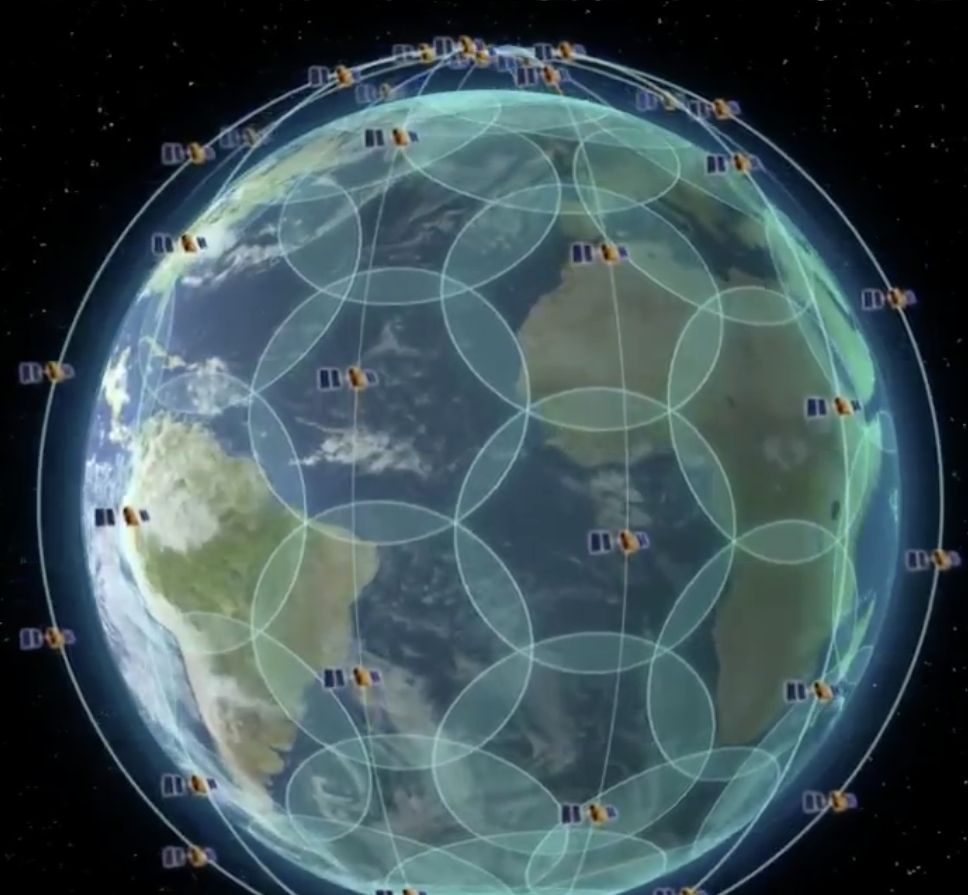
Newer generations of satellite internet options like Starlink instead rely on constellations of many satellites working together in much lower orbits - generally orbiting a few hundred to about 1,200 miles overhead.
The advantage of having satellites in lower orbits is that they are physically close enough to users on the ground to provide fast, low-latency communications rivaling cellular.
But the disadvantage of a lower orbit satellite system is that the satellites are constantly moving in the sky, and it takes many satellites in coordinated orbits to ensure that at least one is always overhead at any given time.
This means that you can't roll out service with just a few satellites; you need to get enough satellites in orbit to provide uninterrupted coverage over your target areas - potentially thousands of satellites.
SpaceX's Starlink jumped into an early lead in this race and has dominated the market so far, but there are other players too - and the next several years are going to be extremely exciting as these new networks (literally) get off the ground.
We track all of these developments and report on major milestones and announcements.
If you're considering a satellite internet option for your RV or boat travels, it is worth staying updated on the latest details of these upcoming options.
Here's all of our most recent satellite internet news coverage:
In addition to these news stories, we are doing our best to keep the below content updated for all of the major players, too.
RV & Boat Satellite Internet Realities
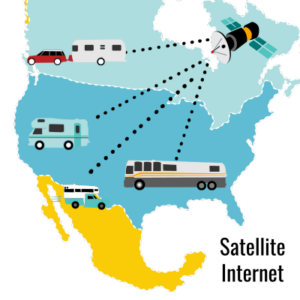 With all satellite systems, one challenge is unavoidable - to stay connected, you will always require a clear view of the sky.
With all satellite systems, one challenge is unavoidable - to stay connected, you will always require a clear view of the sky.
Satellite internet requires a clear line of sight between your receiver and the satellite to work - meaning you might not be able to get connected while your RV is parked under a shady tree, next to a tall building, or in a canyon.
With geosynchronous satellites, you might be able to aim between a gap in the trees at the fixed target. But since LEO satellites are in motion overhead, any obstructions nearby might result in dropouts as the satellite passes behind branches, buildings, or boulders.
Because of these constraints, LEO satellite constellations are NOT going to be a universal magical replacement for RV internet service any time soon.

Even Elon Musk is clear that this is not his aim with the Starlink system:
"I wanna be clear, it's not like Starlink is a huge threat to telcos. I want to be super clear. It is not. In fact, it will be helpful to telcos because Starlink will serve the hardest to serve customers that telcos otherwise have trouble doing with landlines or even with cell radio stations, cell towers."
And it is not just about where you can get connected; satellites experience congestion in areas with too many customers, just like cellular.
In more populated areas, there likely will never be enough satellite bandwidth to go around compared to what cellular and wired services like fiber and cable can provide.
In an urban or suburban area, a satellite will likely never be able to fully compete with a built-out cellular infrastructure on the ground.
On the other hand, in many remote areas, it will never make sense to build a network of cell towers, and no matter how much cellular companies expand, there will ALWAYS be gaps in coverage.
The future is bright with these satellite internet options for RV and boat travels, and satellite has now become an integral part of a mobile internet arsenal. Enabling low-latency broadband in many places where it was completely unavailable before.
However, most RV and boat nomads will not be able to rely solely on satellite internet. For many RVers and cruisers, a mix of cellular, Wi-Fi, and satellite will remain the key to staying connected everywhere.
The ideal connectivity future involves a mix of satellite and cellular, with service roaming seamlessly to the best connection possible wherever you happen to be.
Getting Internet From Space - Basics
Satellite internet can be confusing. It is important to make sure that you understand the basics.
Satellite TV and Satellite Internet Are Not the Same!
 Receiving a signal from space isn't particularly hard.
Receiving a signal from space isn't particularly hard.
Transmitting a signal back to a satellite, on the other hand, is where it gets tricky.
Satellite TV dishes are receive-only devices and have no capability to transmit. Internet usage, however, requires two-way communication – and thus much larger and more complicated gear both on the ground and in space.
Some people get confused because they see satellite TV providers Dish Network and DirectTV sometimes advertising bundled packages that include internet service – but this is usually not satellite-provided internet.
These bundled plans are intended for stationary satellite TV consumers to combine their TV, wired internet, and phone bills into one. The satellite TV provider contracts out to local phone or even partner cable companies to provide the actual internet service – usually relying on a hard-wired internet connection.
Customers in rural areas beyond the reach of a wired partner may instead get partnered with a residential stationary-focused satellite internet option - usually ViaSat or Hughes, with an entirely separate dish setup than is used for TV reception.
In other words – not mobile friendly at all.
NOTE: Though the dishes look similar, most satellite internet systems are strictly for internet service, and are NOT compatible with any satellite TV services. If you also want satellite TV to go along with satellite internet, you'll actually need a second dish!
Residential Satellite Service Generally Is NOT Mobile Friendly
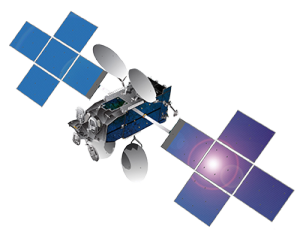
There are two main consumer-focused residential satellite internet companies today using geostationary satellites: ViaSat and HughesNet.
There used to be other options, but those companies either went out of business or were acquired by ViaSat or HughesNet.
Even if you're getting satellite internet from a provider using another name, it is likely one of these two companies behind the scenes providing the actual service.
Both of these residential satellite internet services are NOT designed for mobility. Moving locations usually requires a visit from a professional installer, and sometimes purchase of new equipment and a plan change.
Even if you had the tools to move and aim their gear at a new location, the network will detect you have moved and will not allow you to connect without an installer signing off that things are set up properly.
While you can usually get a dish permanently mounted at your summer and winter bases, and then just move the modem in between - we don't consider either of these as viable connectivity options for users who move more than once or twice a year.
There are mobile satellite internet solutions out there presently suitable for mobile RVers, discussed later in this guide.
Starlink Satellite Internet Mobile RV Use Official
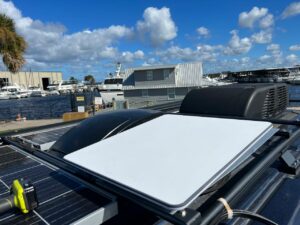
Starlink's last major plan update in June 2023 included official options for RV and boat satellite internet.
Starlink currently has a couple service plan categories broken out into personal options and business options.
The personal categories are Residential & Roam, while the business categories are Local Priority & Global Priority, which map to in-country vs worldwide/maritime higher-priority use cases.
The options can be confusing when it comes to what each plan offers and the specific plan restrictions, like the ability to roam, in-motion use, data priority levels, ocean use, etc. Below is the featured guide with more details.
SpaceX has partnered with outside companies such as Winegard, Best Buy, Home Depot, Walmart, and Peplink to sell Starlink to consumers.
Because Starlink is such a hot topic, we have published a guide devoted to the topic:
- Starlink Satellite Internet For Mobile RV And Boat Use - Our featured guide focused on taking advantage of SpaceX's Starlink on the go.
Member Exclusive Content Below
Member Exclusive Content In This Guide
Has this guide been helpful so far?
Well.. there's a lot more below available to our members. As well as dozens of other guides like this, videos, classrooms, forums, webinars and more. All specifically created for helping keep RVers, cruisers and nomads online.
Consider Becoming a Member
If mobile internet is an important part of your lifestyle, a membership can help keep you connected with these exclusive benefits:
- in-depth exclusive content
- interactive guidance
- vendor discounts
- alerts & insider tips
- classroom
- community
Free Content Like This Made Possible By Our Members!
We are community funded via our premium membership program - allowing us to focus on creating unbiased quality, in-depth, constantly updated content. We don't accept 3rd party advertising, we're not sponsored and we don't sell 'stuff'.
Already a member?
Log in to continue with this guide.
Check out the Topics Covered in the Member Section:
Geostationary Satellite Fundamentals & Options
HughesNet and ViaSat are the primary geostationary options available, and we go into more depth on both. We explain concepts like spot beams from satellites, coverage map concerns, tripods vs roof mounts, and latency issues.
The Ongoing LEO Revolution
SpaceX's Starlink has been ramping up fast, and it is quickly becoming the satellite option of choice for many nomads - even a roam option is offered.
Low Earth orbit satellites are the future, and this section dives into SpaceX's Starlink - and takes a look at its upcoming competitors, including Amazon's Leo, OneWeb, and more. We also cover upcoming plans to provide cellular service from space that is compatible with existing mobile phones!
Satellite Communicators and Low Bandwidth Options
If you learn to think a bit differently - it is amazing how far (literally) 160 characters of text can take you. This section goes over low-bandwidth satellite options like the Garmin inReach, Spot, and Iridium Go.
Satellite Internet - A Bright Future Ahead!
We have a lot to look forward to when it comes to satellite broadband.
Starlink's service became global in 2023 and now offers service in over 150+ countries/territories/markets around the world. Starlink reports continued expansion and network growth year-over-year, with dozens of new market launches and millions of additional active customers.
Amazon's LEO prototype satellites are finally in orbit allowing them to prove their architecture and demonstrate gigabit performance and inter-satellite laser links, clearing the way for Amazon to begin the massive undertaking required to rapidly launch its planned 3,236 satellite constellation.
OneWeb has a lot of launches ahead of it, but is once again making progress as another provider.
With so much to look forward to - it is looking like it will be an exciting future decade in space!
But keep in mind - even if all these next-generation networks pan out, satellite internet will likely never completely replace the need for cellular connectivity.
But it will be great to at last have truly no-compromise connectivity options that work absolutely anywhere!
Satellite Internet Options Product Guide
Here are all the satellite options we are tracking in the product center - ranging from full-on mobile solutions to very basic on-the-go options.
RV Note: For most RVers, Starlink is now the clearly best option. The roof-mounted RVDataSat system and the tripod-based HughesNet Gen5 Spot Beam options are the best of the legacy bunch.
Marine Note: Satellite internet is currently a LOT trickier for boats unless you can mount the dish to a fixed dock. For boats rocking on the water, locking onto a broadband satellite in geosynchronous orbit is prohibitively difficult without a super-yacht budget. This tends to leave only the systems that do not require precise aiming as options, like satellite messengers, as worthy of consideration. Starlink is becoming a very popular option worth considering with global coverage around the world and official in-motion usage on land and on water.
Click on each option in the grid for more details:
Additional Reading
Related Guides
- Starlink Satellite Internet For Mobile RV And Boat Use - Our featured guide focused on taking advantage of SpaceX's Starlink on the go.
- Assessing Your Mobile Internet Needs
- Travel Planning Around Connectivity for RVers and Cruisers
- Thinking Outside the Box - Alternatives to Traditional Mobile Internet Options
- Testing & Understanding Your Mobile Internet Speeds
Related Articles
Explore the Resource Center
Have Questions?
Join our 'Library Desk':
Internet for RVers & Cruisers Facebook Group
We cross post news articles and guides, and can help point you in the right direction to our content here on the resource center.
It is with gratitude to our premium members that we're able to offer our free content - and for that, they also have access to our member Q&A areas for more in-depth guidance.
Become a Member
 The MIA is our premium membership - designed for those who consider mobile internet an important part of their lifestyle.
The MIA is our premium membership - designed for those who consider mobile internet an important part of their lifestyle.
In thanks for making content like this possible, we offer a bunch of additional perks. From interactive guidance, in-depth member exclusive content, discounts, alerts, classroom and ability to book private advising sessions.
Stay In the Know
We're constantly tracking the industry and analyzing new developments for mobile travelers. If you'd like to receive updates, we offer several ways:
- Subscribe to our free monthly newsletter
- Subscribe to our News Stories RSS Feed
- Subscribe to our YouTube Channel
- Follow our Facebook Page
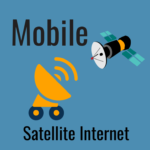







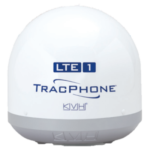
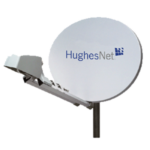


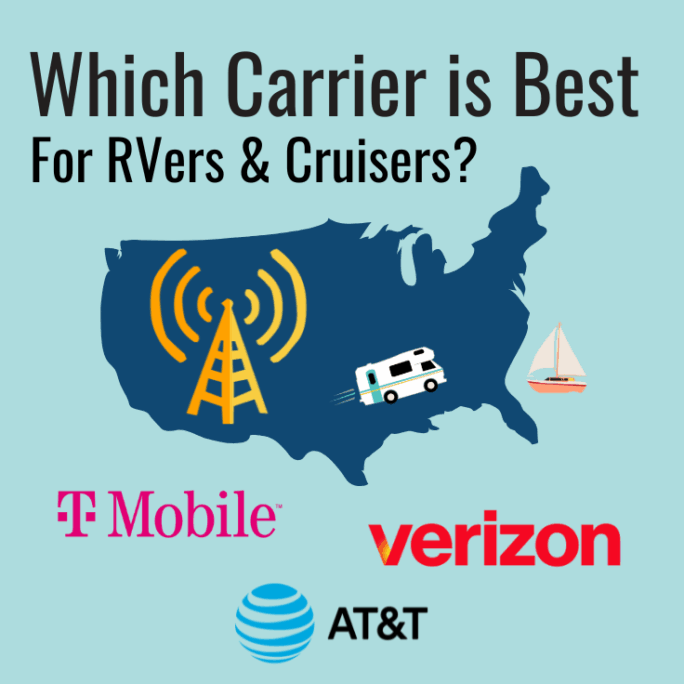

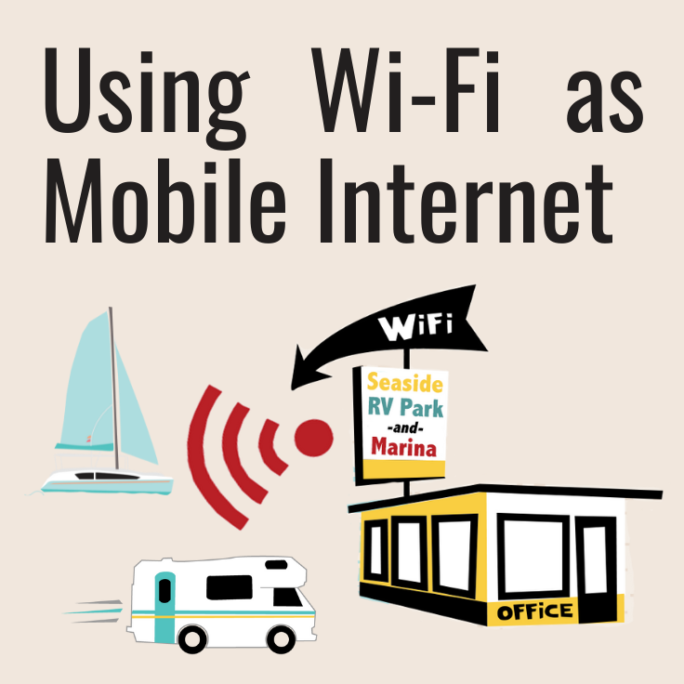
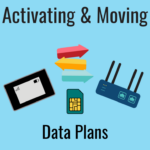

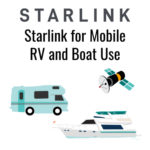
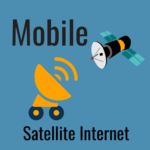


 Mobile Internet Resource Center (dba Two Steps Beyond LLC) is founded by Chris & Cherie of
Mobile Internet Resource Center (dba Two Steps Beyond LLC) is founded by Chris & Cherie of